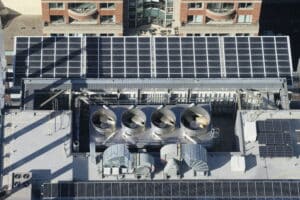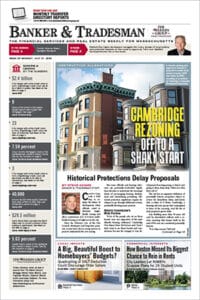
The HVAC systems on the roof of 888 Boylston St. in Boston. Photo by James Sanna | Banker & Tradesman Staff
State officials have picked Northampton to round out its fossil fuel-free building pilot program, skipping over an application from Somerville officials.
The Department of Energy Resources had earlier accepted Arlington, Lexington, Brookline, Acton, Concord, Cambridge, Lincoln, Newton, West Tisbury and Aquinnah into the 10-town program established in a 2022 state clean energy law, but West Tisbury withdrew from the program after local leaders decided they wouldn’t be able to meet the program’s requirement that at least 10 percent of the town’s housing stock qualify as affordable housing. Towns in MBTA service areas are also required to pass MBTA Communities-compliant multifamily zoning if they’re served by the transit agency.
Only Northampton and Somerville applied to replace West Tisbury, but Northampton won out amid concerns the program skewed towards well-heeled Boston-area communities. Their higher rents could help cover what developers say are the higher costs inherent in using all-electric building systems.
“Regional equity is a top priority for the Healey-Driscoll administration. We’re pleased to welcome Northampton to the fossil fuel-free pilot program, alongside nine other communities. We look forward to learning from this program as we work to decarbonize our buildings,” DOER Commissioner Elizabeth Mahony said in a statement. “Choosing between two communities on the cutting edge of climate innovation was challenging, and we want to thank Somerville for its bold climate leadership. As the pilot gets started, we encourage all communities interested in lowering emissions and energy costs to adopt the specialized energy stretch code to ensure new buildings are equipped with heat pumps and other electric appliances.”
The pilot lets participating towns ban natural gas hookups for new construction or major renovations, turning them into testing grounds for advocates’ claims that all-electric developments are cost-competitive with traditional ones.
Developers have argued that, even when designing a building from the ground up to use heat pump-based HVAC systems they face a cost premium. Those come on top of the extra carrying costs and architects’ and attorneys’ fees projects rack up during the drawn-out zoning variance processes most Massachusetts developments must go through.
Oil- and gas-fired boilers and water heaters still used in many homes make the building sector one of the largest sources of greenhouse gases in Massachusetts, after cars and trucks. Large commercial buildings’ natural gas-powered water heaters and air chillers are also major contributors.
“Northampton is honored to join the state’s Fossil Fuel Free Demonstration Program, marking a milestone for Western Massachusetts in the transition to sustainable building practices,” Mayor Gina-Louise Sciarra of Northampton said in a statement provided by DOER. “This program builds on our community and the state’s commitments to climate action. We are ready to share our experiences and learn alongside other pioneering cities as we all work toward a greener, renewable commonwealth.”
The state had earlier rejected Boston’s efforts to join the pilot program, but Mayor Michelle Wu still sought to use the city’s zoning code to limit carbon emissions from new developments. That zoning proposal failed in August, but the administration indicated it plans to propose a revised version after changing the makeup of the Boston Zoning Commission.
For her part, Somerville Mayor Katjana Ballantyne said in a statement that the city would still prioritize ways to become carbon-negative by 2050.
“So, hen the next opportunity arises, we aim to be first in line. And to be clear, we will continue our broader efforts to decarbonize, including strategic zoning, networked geothermal, and advocating for closing the $1 billion-dollar gap in Somerville’s electric grid preventing multi-family homes and businesses from electrifying,” she said. “Climate change is not some crisis in the future we are buckling up for. Climate impacts are already here, and we need climate action now.”
With the new stretch energy code being adopted by towns and cities across Massachusetts, however, new buildings are coming under more pressure to go all-electric. In a statement – Somerville’s 2023 adoption of that code “is effectively pushing buildings to be all-electric,” Somerville’s Director of Sustainability and Environment Christine Blais said in a statement.
The city is also in the process of developing zoning incentives to encourage all-electric buildings to go with existing, “stringent sustainable design requirements,” she said.
This story has been updated with comments from Somerville officials.






